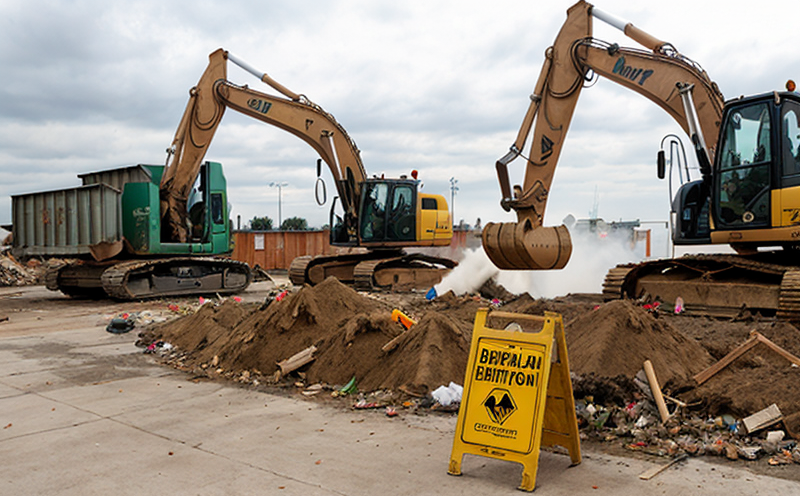EN 1744-3 Chloride Content in Recycled Aggregates
The European standard EN 1744-3 outlines the procedure for determining the chloride content in recycled aggregates, which is crucial for ensuring the quality and longevity of construction materials. This testing method plays a vital role in waste management and recycling processes by providing reliable data on the presence of chlorides within recycled aggregates.
Chloride contamination can lead to accelerated corrosion of steel reinforcement in concrete structures, posing significant risks to structural integrity and durability. The standard specifies precise methods for sample preparation, testing procedures, and acceptable limits based on international best practices. Compliance with EN 1744-3 ensures that recycled aggregates meet stringent quality requirements, thereby promoting sustainable construction practices.
Our laboratory adheres strictly to the guidelines outlined in this standard, employing advanced analytical techniques such as X-ray Fluorescence (XRF) spectrometry and Inductively Coupled Plasma Mass Spectrometry (ICP-MS) for accurate chloride content determination. These methods allow us to deliver precise results that are critical for meeting regulatory standards and ensuring product quality.
By partnering with our laboratory, you can trust in receiving comprehensive reports that not only comply with EN 1744-3 but also provide valuable insights into the overall composition of your recycled aggregates. This information is essential for optimizing material performance, reducing waste disposal costs, and enhancing environmental sustainability.
Industry Applications
- Construction Waste Management: Ensuring that recycled aggregates used in new construction projects do not contain excessive chloride levels which could compromise structural integrity.
- R&D Engineers: Developing innovative solutions for processing and recycling waste materials into usable aggregates while adhering to strict quality standards.
- Quality Managers: Monitoring the quality of recycled aggregates throughout their lifecycle, from initial collection through to final product use.
- Procurement: Evaluating suppliers of recycled aggregates based on compliance with relevant international standards like EN 1744-3.
| Application | Description |
|---|---|
| Construction Waste Management | Ensuring that recycled aggregates used in new construction projects do not contain excessive chloride levels which could compromise structural integrity. |
| R&D Engineers | Developing innovative solutions for processing and recycling waste materials into usable aggregates while adhering to strict quality standards. |
| Quality Managers | Monitoring the quality of recycled aggregates throughout their lifecycle, from initial collection through to final product use. |
| Procurement | Evaluating suppliers of recycled aggregates based on compliance with relevant international standards like EN 1744-3. |
The testing process involves careful sample preparation, ensuring that the aggregate particles are representative and free from contamination. The samples undergo rigorous analysis using state-of-the-art equipment to determine chloride content accurately. Our team of experienced professionals guarantees meticulous attention to detail throughout every stage of the procedure.
Quality and Reliability Assurance
To ensure consistent quality, our laboratory maintains strict adherence to EN 1744-3 standards. We utilize advanced analytical equipment such as XRF spectrometers and ICP-MS instruments that provide precise measurements of chloride content in recycled aggregates. Our rigorous quality control measures include regular calibration checks and proficiency testing against recognized reference materials.
Our team consists of highly qualified experts who possess extensive experience in waste management, recycling, and construction industry standards. They stay updated with the latest developments in analytical techniques and continuously refine their practices to meet evolving regulatory requirements. This commitment ensures that our clients receive reliable test results they can trust.
We also offer additional services including assistance with sample preparation, method validation studies, and interpretation of test data. These complementary offerings help organizations integrate EN 1744-3 compliance into broader quality assurance programs effectively.
Environmental and Sustainability Contributions
The testing of chloride content in recycled aggregates contributes significantly to environmental protection efforts. By accurately assessing the level of chlorides present, we assist clients in making informed decisions about which materials are suitable for reuse without posing risks to structures or ecosystems.
Compliance with EN 1744-3 helps promote circular economy principles by encouraging efficient use of resources and minimizing waste generation. Through this service, we support sustainable development goals by reducing reliance on virgin raw materials while enhancing the performance and longevity of built environments.
The accurate identification and management of chloride levels in recycled aggregates contribute to safer infrastructure projects worldwide. This reduces maintenance costs associated with premature deterioration due to corrosion issues caused by chlorides.





